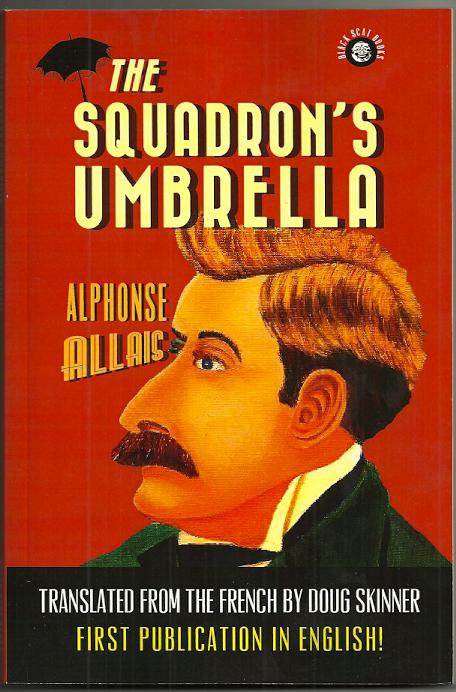The Squadron’s Umbrella is now out from Black Scat Books! In the words of the publisher:
Authored by Alphonse Allais
Translated by Doug Skinner
Alphonse Allais (1854-1905) was France’s greatest humorist. His elegance, scientific curiosity, preoccupation with language and logic, wordplay and flashes of cruelty inspired Alfred Jarry, as well as succeeding generations of Surrealists, Pataphysicians, and Oulipians. THE SQUADRON’S UMBRELLA collects 39 of Allais’s funniest stories — many originally published in the legendary paper LE CHAT NOIR, written for the Bohemians of Montmartre. Included are such classic pranks on the reader as “The Templars” (in which the plot becomes secondary to remembering the hero’s name) and “Like the Others” (in which a lover’s attempts to emulate his rivals lead to fatal but inevitable results.) These tales have amused and inspired generations, and now English readers can enjoy the master absurdist at his best. As the author promises, this book contains no umbrella and the subject of squadrons is “not even broached.”


10 responses so far ↓
1 Win // Mar 6, 2015 at 11:06 pm
As one of the gaping morons who, despite having a decent handle on French and a lifelong interest in French literature, have found your herculean project to bring Allais’ work into English a gratifying education, I was honestly startled to hear that he was France’s greatest humorist. Not that I could begin to name any other candidates apart from Rabelais or Queneau, but is that a consensus opinion or an advocacy? I’m also curious how broadly his tales amused and inspired generations; was he widely read in his lifetime or thereafter? Would love to have more context, especially without having to go the trouble of actually researching this topic personally. Cheapskates and couch potatoes the world over would be eternally in your debt for further details…
And once again, congratulations! What a fine shelf of publications you are creating!
2 Doug // Mar 7, 2015 at 8:04 am
Honestly, I don’t know if he was France’s greatest humorist; I suppose it would be hard to quantify. He’s certainly one of the most durable and influential. Yes, he was and is widely read in France; his books have never been out of print. He somehow appealed both to a general audience (since he was funny) and to writers (since he was inventive). His one-liners turn up wrapped around Christmas candy; his one novel has been turned into a movie a couple of times; Pataphysicians call him the Patacessor; Oulipians call him an “anticipatory plagiarist.” Breton included him in his “Anthology of Black Humor”; Jarry swiped from him; Duchamp was reading him the day he died; Brassens cited him as an influence. For an appreciation of Allais’s literary ingenuity, do read Umberto Eco’s masterful analysis of “Un drame bien parisien,” in “Lector in Fabula.” (Eco, by the way, also received this year’s Prix Alphonse Allais, from the Académie Alphonse Allais.)
I wouldn’t say my efforts are herculean, just four books, and a smattering of short pieces. At any rate, my next translation will be a break from Allais: a deservedly unknown but entertaining writer, Pierre-Corneille Blessebois, known as “the Casanova of the 17th century.”
3 Amateur Reader (Tom) // Mar 9, 2015 at 11:19 pm
I too was a little skeptical of the claims for Allais, but no more, no more. Thanks, Doug! The new book is on its way to me.
4 Doug // Mar 10, 2015 at 9:54 pm
I didn’t realize I was such a figure of suspicion! Readers often think writers who go for the funny aren’t serious. This can be a mistake.
5 Amateur Reader (Tom) // Mar 13, 2015 at 12:18 pm
I expected Allais’s work to be period pieces (from a period of the highest interest, but still). Happily, that turns out to be much less true than I expected.
6 Doug // Mar 13, 2015 at 8:38 pm
My apologies; I didn’t mean to tar you with that brush. I was thinking about the all too common tendency to treat comic writers as less worthy. which may explain why anglophone readers haven’t paid attention to Allais. After all, when I tried to place a few volumes of Captain Cap in a Brooklyn bookstore, the proprietor icily told me that they didn’t stock humor books. Allais was essentially a journalist, who wrote funny pieces for the papers, and that type of writing is usually ephemeral. But his work survived, for a number of reasons.
7 Win // Mar 15, 2015 at 5:16 am
For what it’s worth, my own query was born not from skepticism but from surprise, of the rather mild kind I’ve become accustomed to as I travel further through life and become more and more acquainted with the broadening reaches of my ignorance. And I couldn’t agree more about the snobbishness of booksellers, and indeed most arbiters of “quality” art, towards humorists. Apparent nonsense by the likes of Myles na Gopaleen, Stephen Leacock, Robert Benchley and so on transcends the ephemeral and in my experience does more to sustain sanity in this world than much that passes for serious or profound.
8 Doug // Mar 16, 2015 at 1:22 pm
Too many people confuse the serious with the solemn. Myles, Benchley, Leacock, and Allais were far more serious writers than many purveyors of solemn literature. I suppose American readers are unfamiliar with Allais because so little of his work had been translated.
9 Amateur Reader (Tom) // Apr 7, 2015 at 5:34 pm
I have reviewed the book, or whatever it is I do. Great job, Doug.
10 Doug // Apr 8, 2015 at 10:49 am
Thanks, Tom! I’m glad to hear that Allais is still getting laughs.